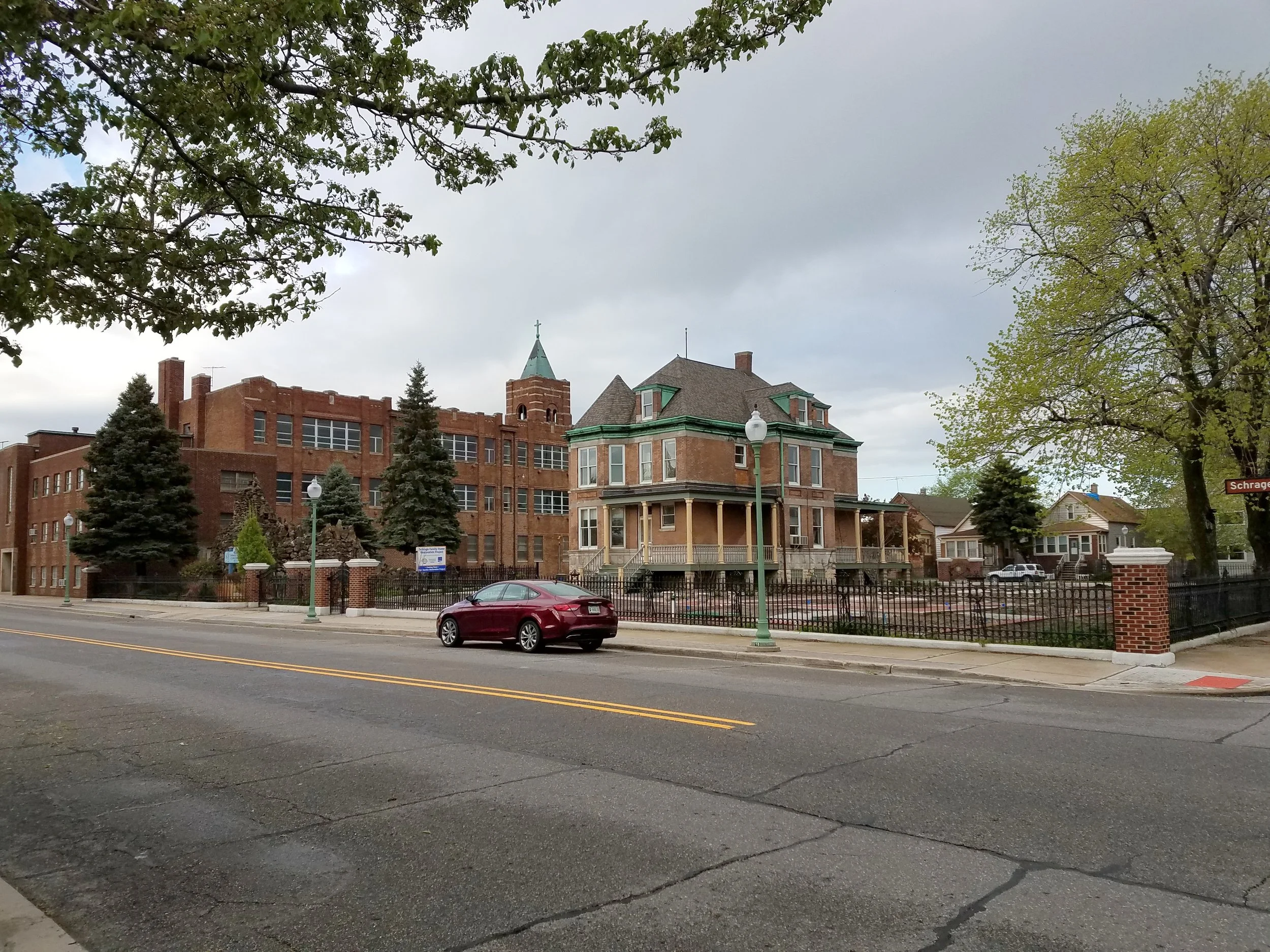Almost everyone in Whiting-Robertsdale knows where the Schrage Mansion is. But very few probably know that Henry Schrage, the Whiting pioneer who built the house in the early 1900s, once kept a yard full of chickens on his property.
You can learn much more about the Schrage family, and the key role they played in the early history of Whiting, at the September meeting of the Whiting-Robertsdale Historical Society. Speakers Anthony Contrucci and Kirsten Markusic will also talk about Centier Bank, which is still a successful business almost 125 years after it was created by Henry Schrage as the Bank of Whiting. There is no charge to attend the meetings of the Historical Society, and all are welcome to attend. It will begin at noon on Thursday, September 26, and will be held on third floor of the Mascot Hall of Fame. To attend, go to the front desk of the museum to sign in.
The Schrage Mansion is in the background. In the foreground is the lot where Immaculate Conception Church once stood. But before the church was built in the 1920s, Henry Schrage used this lot next to his home to raise chickens.
The chickens that were kept next to the Schrage family home, which is at 2006 Schrage Avenue, were a fond memory that Virginia Schrage Hauser had of her grandfather’s house. Virginia shared some of her memories in a letter to the Historical Society in 1976. She said the chickens were kept on the lot to the south of the home. The only thing on that lot these days is the grotto to the Immaculate Conception. The Immaculate Conception Church stood there until recently. But even before the church was built, the lot was owned by Henry Schrage, and he used it for his chickens.
“I would ride my bike over to grandpa’s house and get fresh eggs,” Virginia remembered. “My grandmother, Caroline Wuesenfeld, died when I was a young child,” she wrote. Caroline Wuesenfeld Schrage died in 1916. Henry lived until 1932. ”My aunt and uncle and cousins moved into grandpa’s house,” Virginia said, writing about the period after her grandmother’s death. “When Grandpa sold the property on Schrage Avenue, they all moved to Cleveland Avenue.”
Although he didn’t have chickens at the new location, 1646 Cleveland Avenue, Henry Schrage continued to enjoy the fresh food that nature provided. “There,” Virginia wrote, “Grandpa kept bees. I can remember him sitting in the back yard among the beehives.”
As the owner of the community’s first general store, a postmaster, a town official, a township official, and a banker, Henry Schrage was a major figure in the early history of Whiting.
Henry Schrage first came to Whiting in 1854, with his parents. Henry was around ten years old. They settled on 50 acres of land. The family moved to Chicago for a time, and Henry served in the Union Army in the Civil War. He participated in the battles of Chattanooga and Lookout Mountain, and was one of the soldiers who accompanied Gen. William Tecumseh Sherman on his March to the Sea.
After the war, Schrage returned to Whiting and worked with the railroad section hands who were stationed here to maintain the tracks in the area. In 1868, he not only married Caroline Wuesenfeld, but he also opened a general store close to the tracks on 119th near Front Street. It was the first retail business in the city. Caroline did much of the work at the store, while Henry continued his work with the railroad. In 1871, he became the city’s first postmaster, with his store serving as the post office. In the early days of the community, he also served as a town alderman and as a township trustee.
When Standard Oil arrived in 1889, Henry sold some of his land to them and helped the company purchase the rest of what they needed to build a refinery. “With his foresight,” his granddaughter Virginia wrote years later, “he invested his profits in real estate in the area.” And on April 21, 1895, he opened the Bank of Whiting. In 1911, the bank moved from its location at the east end of 119th Street, to its present site at 119th and New York Avenue.

